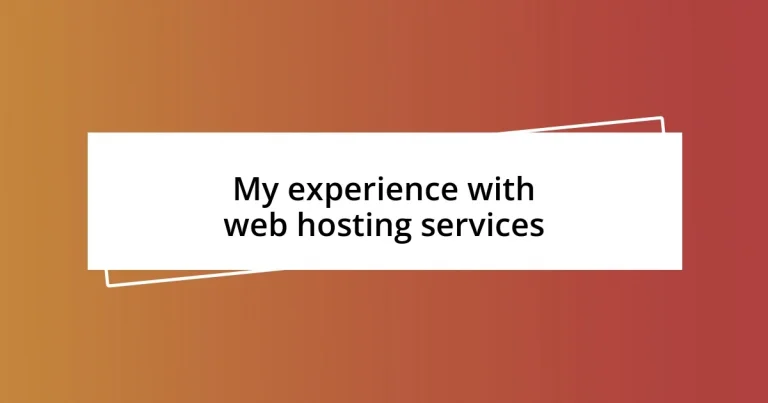Key takeaways:
- Choosing the right web hosting requires careful consideration of your website’s specific needs, traffic expectations, and budget beyond flashy advertisements.
- Customer support, scalability, and performance/uptime are critical factors that can significantly impact your hosting experience and website reliability.
- Personal growth and adaptability in hosting choices are essential, as evolving needs can demand flexibility and a reliable service that supports long-term ambitions.
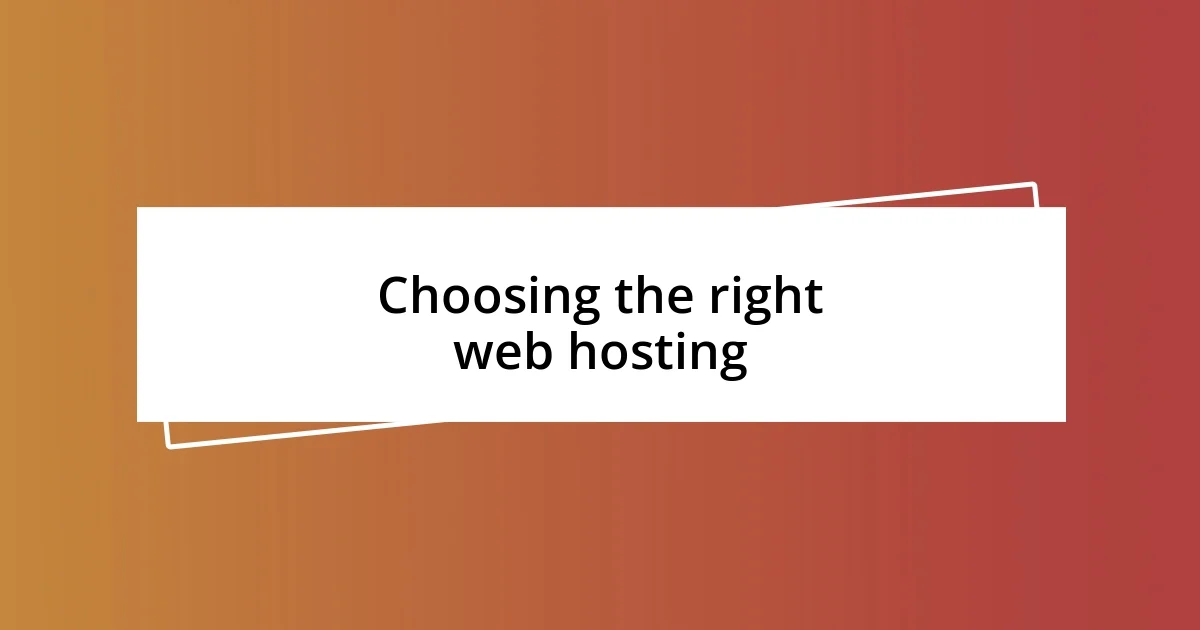
Choosing the right web hosting
Choosing the right web hosting can feel overwhelming, especially with the plethora of options available. I remember when I first ventured into the world of web hosting; I was paralyzed by choices. Should I go for shared hosting or something more powerful like VPS or dedicated? Each choice seemed to have its own set of pros and cons, and the stakes felt high.
In my experience, it’s crucial to assess what your website needs before diving in. I once chose a hosting plan purely based on a flashy advertisement, only to find out it didn’t support the tools I wanted to use. Have you ever felt that sinking feeling when a decision doesn’t pan out? Trust me, it’s disheartening. It taught me to evaluate factors like website size, traffic expectations, and specific platform requirements thoroughly.
Pricing also plays a significant role in selecting a host. I recall opting for an inexpensive option, thinking I was savvy, only to be hit with hidden fees later. What about you? Have you carefully examined the fine print? It’s a reminder to always dig deeper than the surface to ensure the chosen service aligns with your long-term goals.
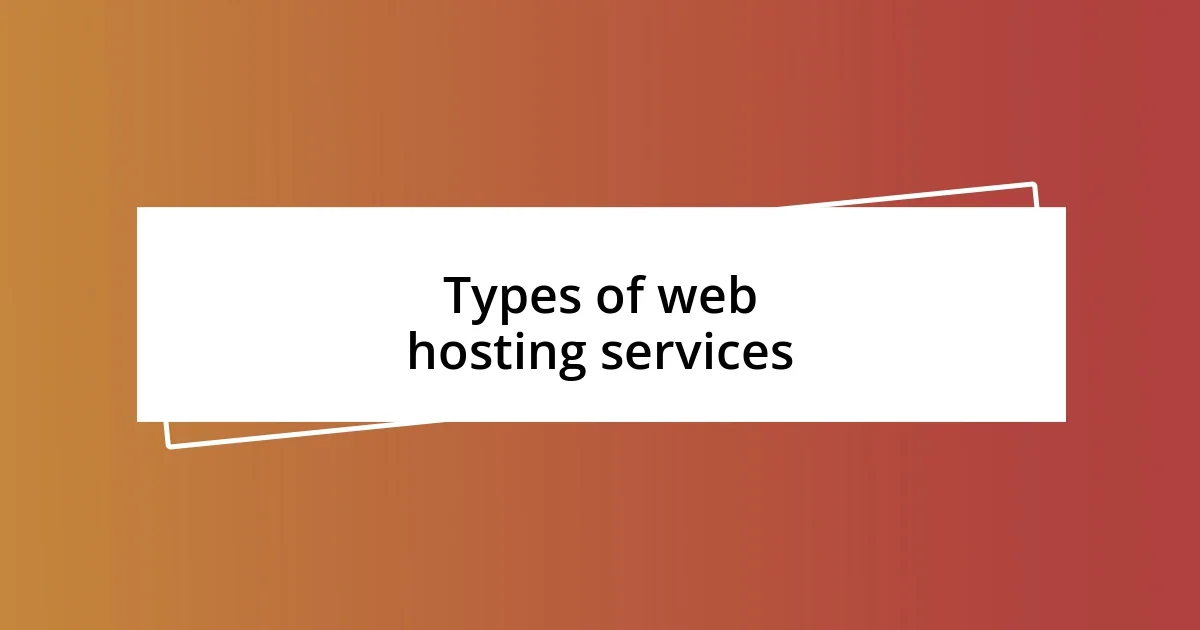
Types of web hosting services
When it comes to web hosting, there are several types to consider, each catering to different needs. It can be surprising how much these options can vary. For instance, I’ve dabbled in shared hosting and learned that while it’s budget-friendly, it’s not always the best for performance. I remember a time when my website slowed to a crawl because of shared server overload. It was frustrating, especially when I had traffic surging!
Here’s a quick rundown of the main types of web hosting services you might encounter:
-
Shared Hosting: Multiple websites share a single server. Great for beginners, but performance can be affected by other sites.
-
Virtual Private Server (VPS): A step up from shared, offering more resources and control through partitioned server space.
-
Dedicated Hosting: You lease an entire server, providing maximum performance and flexibility but at a higher cost.
-
Cloud Hosting: Utilizes a network of servers, allowing for scalability and reliability—ideal for fluctuating traffic.
-
Managed WordPress Hosting: Tailored specifically for WordPress sites, it often includes features like automated updates and enhanced security.
Exploring these options helped me realize that finding the right fit isn’t just about budget—it also involves understanding my website’s specific needs and growth potential. Each type serves a distinct purpose, and finding the one that aligns with your goals can make all the difference in your online journey.

Factors to consider for selection
When selecting a web hosting service, it’s essential to consider the level of customer support provided. I distinctly remember a time when I faced a technical issue late at night; the support team at my chosen host was quick to respond and resolved my problem within minutes. That experience reaffirmed my belief that reliable customer support can be a lifesaver, especially during critical moments. Have you ever found yourself in a tight spot needing immediate assistance? It can make all the difference in your hosting experience.
Another vital factor is scalability. As my project grew, I needed a host that could adapt to increasing demands without significant downtime. I once faced challenges when my previous host couldn’t handle the influx of visitors during a promotional event because I hadn’t considered how my needs might evolve. Thinking ahead about your potential growth can prevent future headaches and ensure your hosting service evolves with you.
Lastly, performance and uptime are non-negotiables for me. During one of my earlier hosting experiences, I encountered several outages that affected my website’s accessibility. After that, I learned to prioritize hosts that emphasize uptime guarantees—after all, your audience deserves seamless access. How important is consistent performance to you? Trust me, investing in a service that prioritizes reliability pays off in the long run.
| Factor | Consideration |
|---|---|
| Customer Support | Responsive and available help when issues arise |
| Scalability | Ability to grow with your project’s needs |
| Performance/Uptime | Reliability metrics to ensure website accessibility |
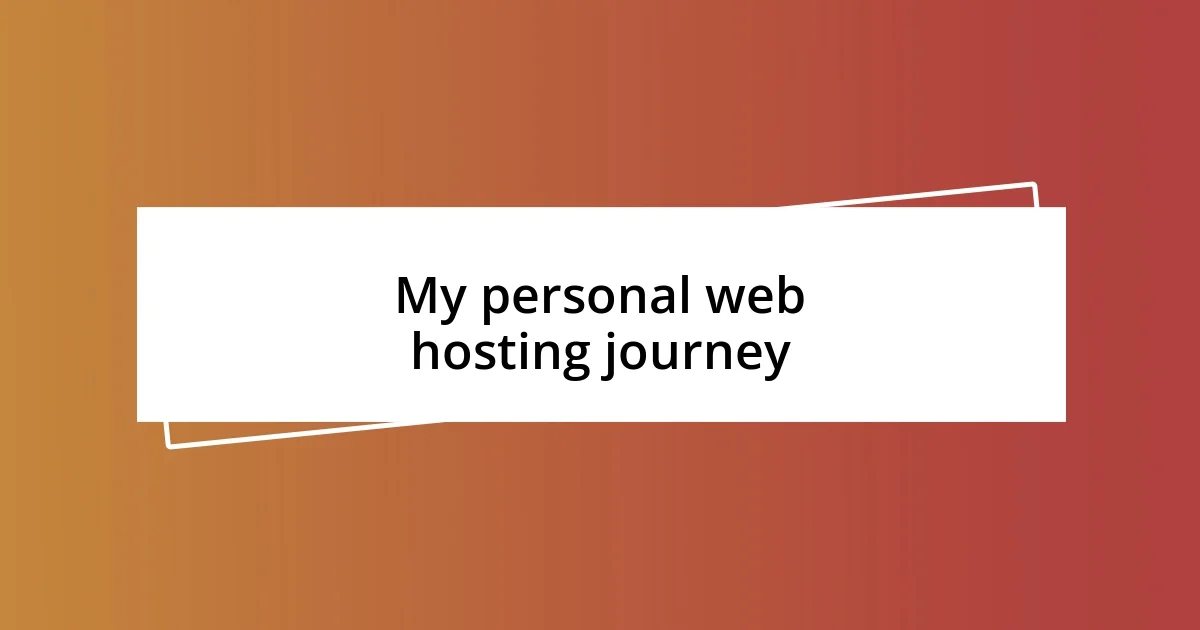
My personal web hosting journey
My personal web hosting journey has been both enlightening and a bit chaotic. I still remember when I first switched to VPS hosting. It felt like stepping into a larger world where I had the freedom to customize and configure my environment, which was liberating! I often think about how nerve-wracking it was to migrate my site. What if everything crashed? But the thrill of seeing my website’s performance soar made it all worthwhile.
One unforgettable moment was during a massive traffic spike caused by a sudden blog post going viral. My previous shared hosting could barely handle the surge, and I was on the verge of panic. After making the leap to cloud hosting, I experienced a newfound peace. I was amazed at how effortlessly my site managed the high traffic without hiccups. Have you ever felt that mix of excitement and dread when your work gets noticed? It’s a rollercoaster of emotions!
Over time, I’ve learned that choosing the right web host is like picking a supportive partner in a venture. I recall a time when my host’s downtime impacted my business just before a big launch. That sinking feeling of watching my website go down when it mattered most taught me the importance of reliability. How much trust do you place in your hosting provider? For me, knowing my website is secure and accessible brings genuine comfort as I navigate my online journey.
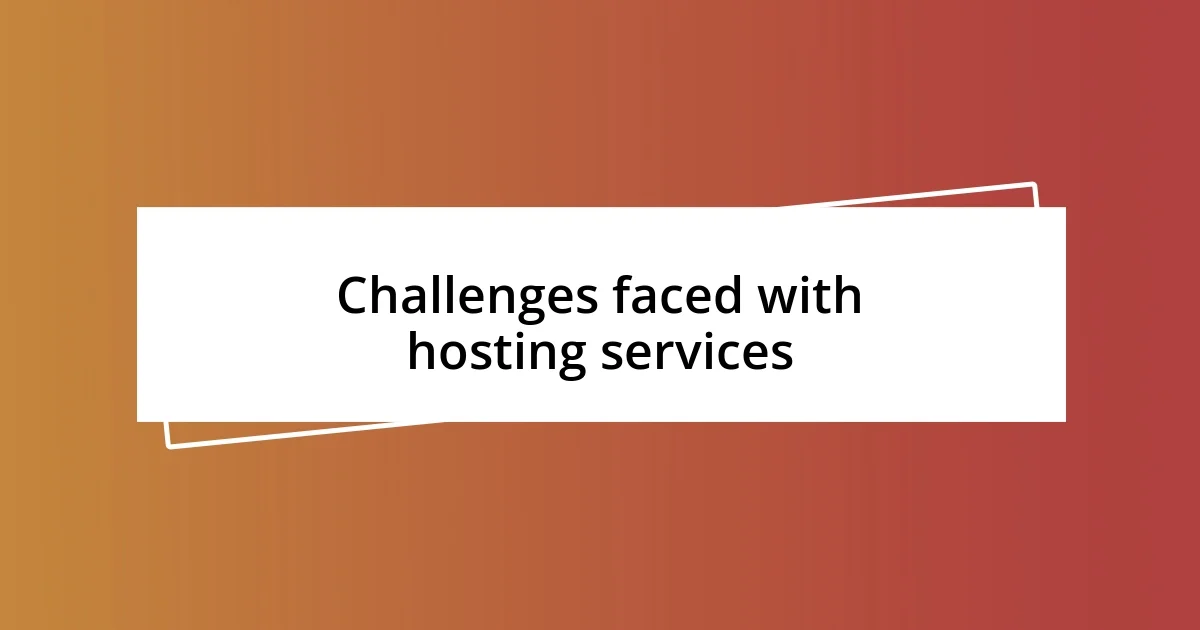
Challenges faced with hosting services
While navigating the world of web hosting, I’ve encountered several challenges that really shaped my experience. One major hurdle was the initial learning curve. When I first started, the technical jargon felt overwhelming. Terms like DNS settings and SSL certificates were foreign to me, and I remember feeling lost. Have you ever been in a situation where you felt like the terminology was designed to keep you out? It was frustrating, but with a bit of research and patience, I eventually got a handle on it.
Another challenge was dealing with unexpected costs. I recall one instance where my hosting plan had a hidden fee that cropped up during renewal. Imagine my surprise when I saw my bill! It made me realize how crucial it is to read the fine print and understand what your plan includes. Has this ever happened to you? Trust me, being informed can save you from those unwelcome surprises.
Lastly, I often struggled with performance issues related to shared hosting. There were times when my website’s speed was so slow that I could almost hear the crickets chirping from visitors leaving in frustration. I learned the hard way just how important it is to choose a plan that fits not just your current needs but your future ambitions. How often do you consider the long-term implications of your hosting decision? It’s something I wish I had thought about sooner, as proper planning can prevent a lot of headaches down the line.
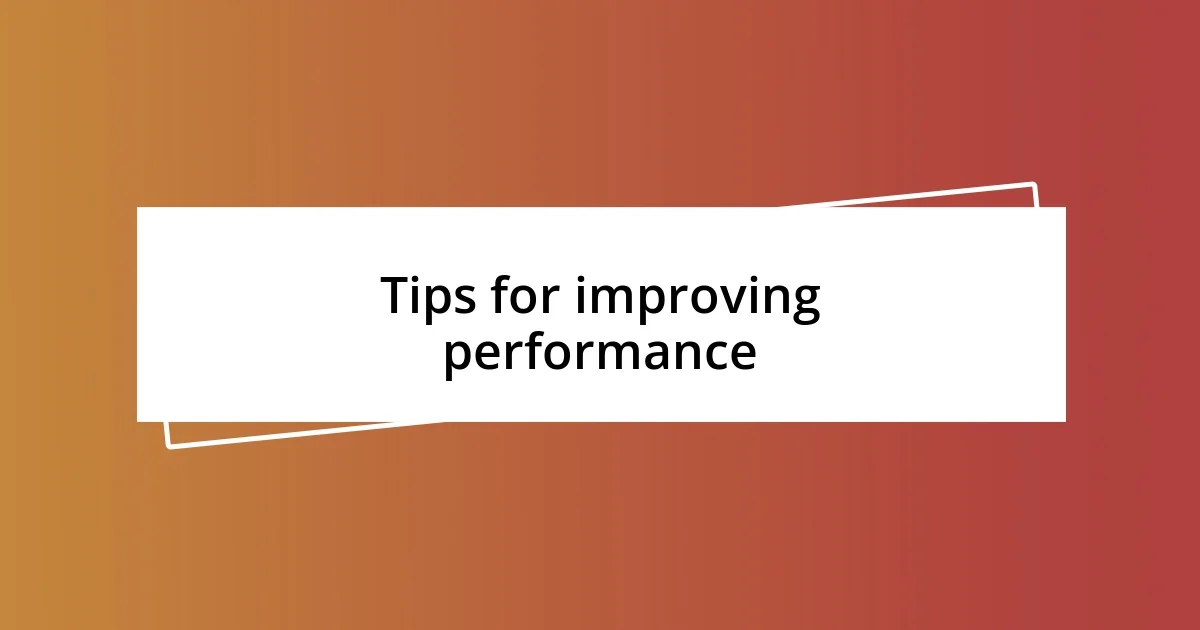
Tips for improving performance
Improving your website’s performance is essential for keeping visitors engaged. One effective strategy I’ve found is optimizing images before uploading them. When I finally started compressing my images, my page loading times dropped significantly. Have you noticed how a few seconds can make all the difference in user experience? It’s incredible how a simple task can have such a huge impact!
Another valuable tip is leveraging content delivery networks (CDNs). When I first integrated a CDN into my hosting setup, I was amazed at how it distributed my content more efficiently. Suddenly, my website was faster for users around the globe! If you are aiming for a worldwide audience, CDNs are truly a game-changer. Just think about how much more enjoyable browsing could become for your visitors if loading times were slashed.
Lastly, I can’t emphasize enough the importance of regular updates. Initially, I overlooked this and learned the hard way when outdated plugins caused my site to crash. It felt like a nightmare watching my hard work go offline, and all because I didn’t keep things up to date. How often do you check your software for updates? Making this a habit can save you from unnecessary headaches and keep your website running smoothly!
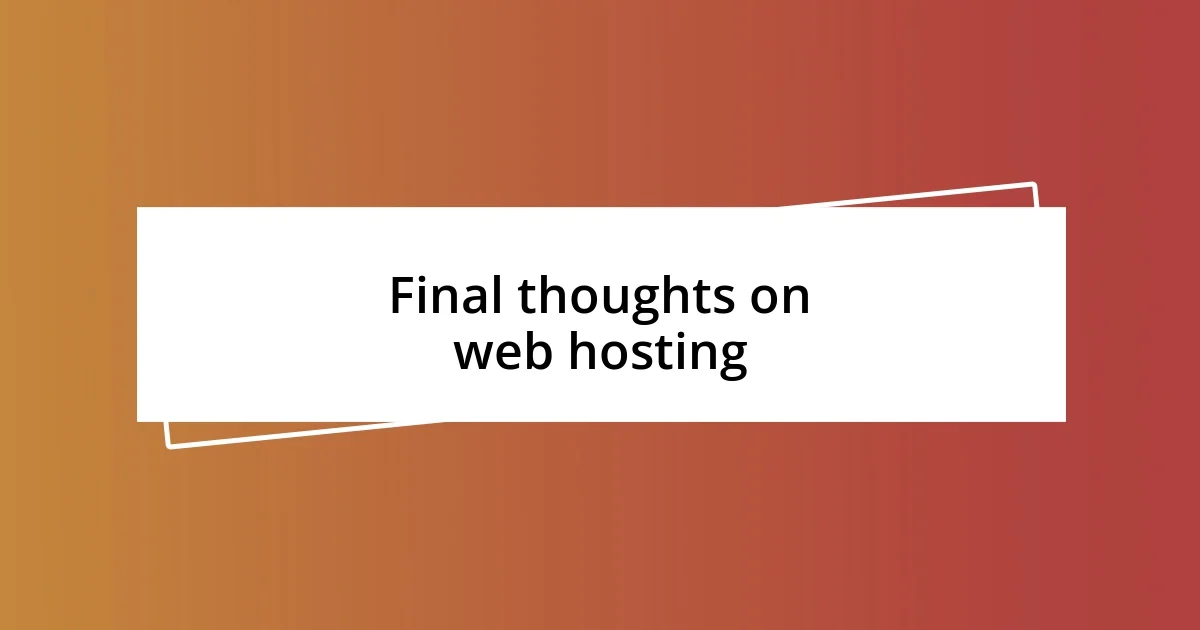
Final thoughts on web hosting
Reflecting on my journey with web hosting, it’s clear that the right choice can make a world of difference. I remember a time when I switched from a budget provider to a more reputable one. The change was like switching from a murky pond to a crystal-clear lake. Can you imagine the relief I felt when my website finally ran smoothly? It really underscored the importance of selecting a reliable service provider.
Another thought that strikes me is the value of customer support. There were moments when I found myself trapped in a web of technical issues, feeling completely overwhelmed. One late night, I reached out to a support team, and to my surprise, they were responsive and knowledgeable. Have you ever felt alone in a tech crisis? The warmth of having someone on the other end who genuinely wanted to help was incredibly reassuring. This experience reinforced my belief that access to excellent support should be a top priority in any hosting decision.
Ultimately, I believe my experience has taught me that flexibility is key. As my projects evolved, so did my hosting needs. A rigid service can stifle growth, whereas a provider that scales with you can empower your ambitions. Have you thought about how your needs might change in the future? It’s a vital consideration that not only affects your current project but your potential for growth down the line.












